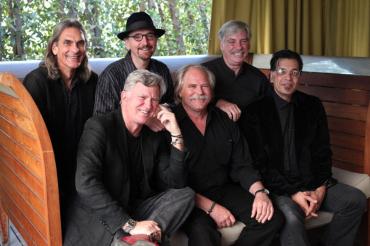Magic Music Casts Its Spell on New Album

If Fairport Convention, Jethro Tull, and the Marshall Tucker Band adopted a child that would follow in their musical footsteps, that child might well be Magic Music. The soundprint of these parents echoes very loudly in the eponymous album by this group that’s been a staple of the Colorado festival circuit for the past forty years. Magic Music’s first-ever studio album captures the energy of the group’s live performances, introducing their lively musical style to anyone unfamiliar with their music.
Guitarists Will Luckey and Lynn “Flatbush” Poyer, and flautist George “Tode” Cahill formed the original group in 1970; in 1972, Chris Daniels joined the group, replacing Poyer, and Tim Goodman also joined the ensemble. Magic Music played at Telluride before breaking up in 1976 without ever releasing an album. Over the past forty years, the musicians have never left the music behind, though, and this new album declares with the quiet power of cascading guitar chords, shimmering cymbals, and breathless flute riffs that the music that continues to live in them can move us mightily.
The new Magic Music lineup includes Jimmy Haslip, a jazz bassist, and Tommy Major on percussion. Special guests such as Sam Bush, The Doobie Brothers’ John McFee, Little Feat’s Bill Payne, and violinist Scarlet Rivera add their own magic to the album.
“El Dorado Canyon” builds slowly with acoustic guitar riffs underscored by the rattle of the percussion and the deliberate backing of congas. By the time the vocals ease into the music, we’re already hypnotized by the repetitive riffs of the instruments. The undulating rhythm underscores the easy and slow life in the canyon: “I take it pretty easy in El Dorado Canyon/Choppin’ wood to stay alive/and when the snow falls in EDC /well, I’m so glad to be alive.” Halfway through the song, though, the song charges into a jazzy, rock riff, replete with driving electric guitar and fluttering flute, before settling back in to the easy rhythm with which the song opened. The song resembles Loggins and Messina’s “Angry Eyes” and the suite of songs that follow it down, as well as the Chicago suite of songs “Ballet for a Girl in Buchannon” from Chicago II, minus the brass, of course.
Magic Music follows down its Celtic path with the fiddle-driven reel, “Sundance,” and the lively, can’t-keep-from-dancing along “Flatbush Jig.” The album opens with a slow-picked acoustic guitar joined by the flute’s sweet echo on “Bring the Morning Down.” The song’s opening recalls Marshall Tucker’s “Can’t You See,” but the song soon moves along to a different drummer with vibrant harmonies and a kind of marching pace that counsels us to greet a day with “grin.” “Bright Sun Bright Rain” opens with an Ian Anderson-like flute that’s soon joined by forceful guitar chords and the group’s entrancing harmonies. “The Porcupine Flats Shuffle” showcases Magic Music’s canny ability to deliver the magical mystical music of bands like Fairport Convention and the declarative folk music of the Youngbloods. The singers declare that on such beautiful days as the ones described in the song “people just got to get along.” Our happiness can start, they proclaim, “with the words to this song.”
Indeed, listening to Magic Music’s new album is bound to bring a smile to your face and some movement to your feet; like some other music that has its origins in the mid-1970s, this album will have you swaying, singing, and smiling.


